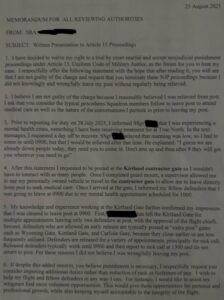The U.S. Air Force is reeling after the tragic death of a 23-year-old airman, who took his own life on Wednesday, September 3, following a harrowing battle with severe depression and disciplinary actions that many say should never have happened.

The airman, whose name is being withheld pending official release, was found dead at Kirtland Air Force Base. His death has sparked outrage, grief, and a powerful call for accountability across the military community and beyond.
Pleas for Help Ignored
According to documents and a memorandum written by the victim before his death, the airman had repeatedly told his chain of command that he was in crisis and needed mental health care. Instead of receiving support, he was allegedly ordered back to duty because, as his commander reportedly said, “manning was low.”
The memorandum also revealed that he had been relieved from his post at the Kirtland gate on July 28, 2025, due to his deteriorating mental health. Rather than compassion, he faced punishment: a demotion, loss of rank, and forfeiture of pay — all issued just days before his death.
Tragically, on Tuesday, September 2, he was served with an Article 15 for leaving his post. Less than 24 hours later, he ended his life.

Commander Under Fire
Col. Matthew Foisy, commander of the 377th Security Forces Group, is at the center of the storm. Thousands have signed petitions calling for his removal and possible charges, accusing him of disregarding both Air Force regulations and federal protections for service members in crisis.
The Brandon Caserta Foundation, an advocacy group named after a sailor who died by suicide after being denied help, issued a scathing statement:
“This Airman killed himself Wednesday night after being demoted on Tuesday and issued an Article 15. The first page of his memo makes it painfully clear: this loss could have been prevented. Despite being in the middle of a mental health crisis, this Airman was ordered to stand guard at the gate. When he told a supervisor he was in crisis, the response should have been compassion and immediate action — not punishment. Instead, his rights under the Brandon Act were ignored.”
Violation of Federal Law
The Brandon Act, signed into law in 2021, grants service members the right to seek mental health treatment confidentially and immediately. The foundation emphasized that the deceased airman was already receiving mental health treatment and, by law, should have been fully protected when he asked for help.
“By ignoring his pleas, his chain of command violated the Brandon Act and failed in their duty of care,” the foundation said.
A Preventable Loss
As the Air Force conducts its investigation, the tragedy is already sparking broader conversations about military culture, accountability, and how service members in crisis are treated. Volunteer groups, mental health advocates, and grieving airmen are uniting to demand systemic change.
“This wasn’t just a personal tragedy,” one volunteer wrote. “It was a preventable loss, the direct result of leadership failures and disregard for the law meant to protect him.”
The airman’s death has left behind devastated family, friends, and fellow service members who now hope his story will not be in vain.



